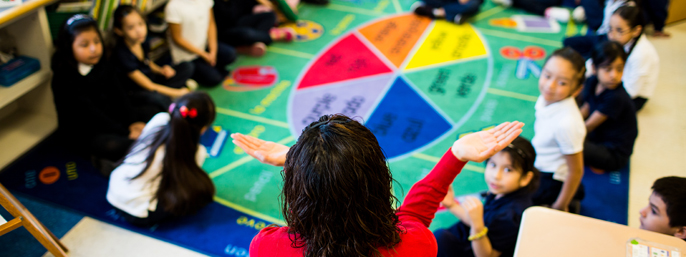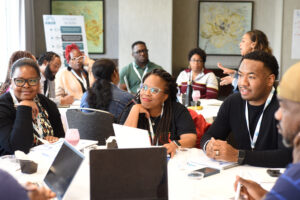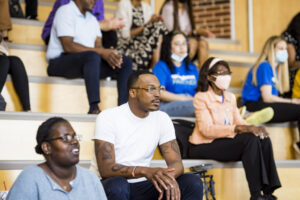Most teachers want useful feedback on their instruction. Yet many feel they don’t get enough, or that the feedback they receive isn’t actionable. We’ve been piloting virtual coaching in over 200 schools and 30 districts to see if video and coaching from an expert outside the school can help teachers get more (and more meaningful) feedback. Some of the questions we’ve been asking are: How does it help a teacher develop to see herself on video? Can a virtual coach—someone a teacher has never met in person—guide the teacher through some specific changes to her practice? How can using video help focus the conversation on what students are learning?
As part of our pilot, we are working with the Center for Education Policy Research at Harvard’s Best Foot Forward project, a study examining the impact of video technology on teachers’ classroom observations. Researchers recruited more than 400 teachers to participate; half were given cameras and submitted self-recorded videos to replace traditional drop-in observations. Teachers also chose which videos to submit to their observers, giving them more control than they generally have in traditional observation processes.
Researchers with Best Foot Forward report that teachers who received feedback on their videos were significantly less likely to disagree with their observers on their evaluation scoring and more likely to be able to describe a specific change in their practice resulting from their post-observation conference. At the end of the study, participating treatment teachers were 12 to 15 percentage points more supportive of video observations than their control group peers, according to project director Miriam Greenberg. Initial findings will be released this summer and a final paper will be available in December.
Teachers in the treatment group of the study also submitted two videos to a TNTP virtual coach in lieu of traditional peer support, and reported appreciating their virtual coach’s outside perspective. Here is what we’ve learned from our participating teachers and coaches about their experience:
Taking time to build a virtual relationship is essential. Even more so than with in-person coaching, the teacher needs to find a virtual coach credible and trustworthy. A virtual coach needs to go out of his or her way to establish a relationship and build rapport. Before they engage in a video observation, the coach and teacher should connect over the phone so the coach can learn about the teacher and the teacher can describe her teaching context and experience. Since they don’t have the benefit of reading body language or knowing someone’s speaking style, proactively establishing a relationship is critical.
In the process of building that relationship, they should also talk about goals. It is extremely helpful for coaches to ask questions like, “What goals must you reach to feel successful? How will your goals help students learn?” and continue to revisit a teacher’s answers as they move forward in the relationship.
Video helps coaches and teachers get more specific. Teachers who have worked with a virtual coach almost always remark on the value of specific feedback. Teachers want an actionable next step to make an observation meaningful. Virtual coaching and the ability to reference back (on the video) to a particular teaching skill or moment in the lesson seemed to encourage this.
For instance, one participating teacher found it a fruitful experience to “look at things from someone else’s perspective and see what they noticed that you didn’t notice yourself.” Another found the coaching experience “much more specific,” compared to her traditional school observations. “Being able to go back to the video and refresh [my] memory of what happened helps make sense of the summative piece,” she added.
Teachers value an outsider’s perspective. Even though building a relationship is more challenging virtually, teachers consistently reported that they found having an outsider’s perspective on their teaching valuable. Sometimes this was related to the content expertise that the coach brought to the table, experience which may or may not have been lacking in their administration. Sometimes just the experience of having a different voice to either validate or challenge their approach was valuable. “A teacher’s only frame of reference is their school,” said one participating coach. “Working with a coach who is an outsider connects the teacher to a national bar for teaching.”
Of course, virtual coaching is not without its challenges. Technology can limit the ability to hear student conversation. More restrictive school networks can block video uploading and sharing. When technology malfunctions and there are few school supports in place, teachers might give up. Coaching a teacher virtually also means that it’s easier for both parties not to follow through. For example, if the feedback a coach gives doesn’t feel connected to a teacher, and if the teacher’s manager isn’t following up, it’s much less likely the coaching will have a lasting impact.
To help alleviate some of these challenges, the Center for Education Policy Research will release a video observation toolkit based on lessons learned from their study to help educators provide the right technology and appropriate supports to make the most out of video observations. You can sign up to receive the toolkit, which will be released this summer.
Matching a coach and a teacher based on content can help add capacity for principals who are generally responsible for many observations, and whose demands are ever increasing. We’ve found that, if approached right, both teachers and coaches see promise in virtual relationships to help support teachers. As we continue to dig into our findings—and eagerly await Harvard’s—we hope to dive deeper into the particularities of virtual support.








